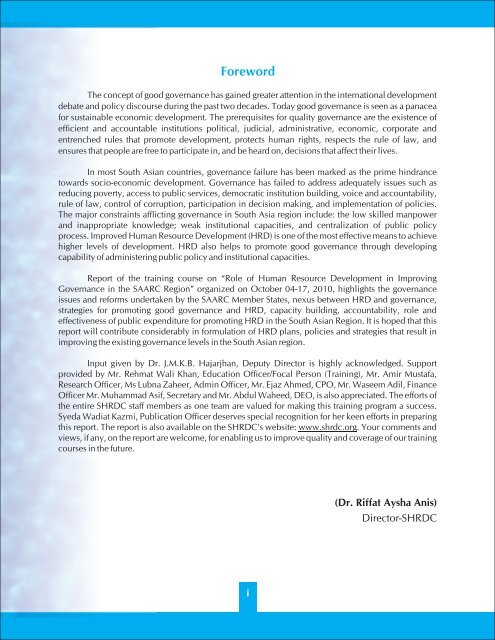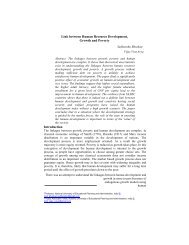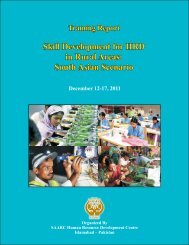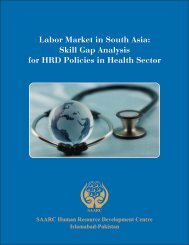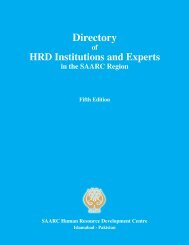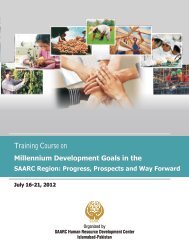Here - SAARC Human Resource Development Centre
Here - SAARC Human Resource Development Centre
Here - SAARC Human Resource Development Centre
You also want an ePaper? Increase the reach of your titles
YUMPU automatically turns print PDFs into web optimized ePapers that Google loves.
ForewordThe concept of good governance has gained greater attention in the international developmentdebate and policy discourse during the past two decades. Today good governance is seen as a panaceafor sustainable economic development. The prerequisites for quality governance are the existence ofefficient and accountable institutions political, judicial, administrative, economic, corporate andentrenched rules that promote development, protects human rights, respects the rule of law, andensures that people are free to participate in, and be heard on, decisions that affect their lives.In most South Asian countries, governance failure has been marked as the prime hindrancetowards socio-economic development. Governance has failed to address adequately issues such asreducing poverty, access to public services, democratic institution building, voice and accountability,rule of law, control of corruption, participation in decision making, and implementation of policies.The major constraints afflicting governance in South Asia region include: the low skilled manpowerand inappropriate knowledge; weak institutional capacities, and centralization of public policyprocess. Improved <strong>Human</strong> <strong>Resource</strong> <strong>Development</strong> (HRD) is one of the most effective means to achievehigher levels of development. HRD also helps to promote good governance through developingcapability of administering public policy and institutional capacities.Report of the training course on “Role of <strong>Human</strong> <strong>Resource</strong> <strong>Development</strong> in ImprovingGovernance in the <strong>SAARC</strong> Region” organized on October 04-17, 2010, highlights the governanceissues and reforms undertaken by the <strong>SAARC</strong> Member States, nexus between HRD and governance,strategies for promoting good governance and HRD, capacity building, accountability, role andeffectiveness of public expenditure for promoting HRD in the South Asian Region. It is hoped that thisreport will contribute considerably in formulation of HRD plans, policies and strategies that result inimproving the existing governance levels in the South Asian region.Input given by Dr. J.M.K.B. Hajarjhan, Deputy Director is highly acknowledged. Supportprovided by Mr. Rehmat Wali Khan, Education Officer/Focal Person (Training), Mr. Amir Mustafa,Research Officer, Ms Lubna Zaheer, Admin Officer, Mr. Ejaz Ahmed, CPO, Mr. Waseem Adil, FinanceOfficer Mr. Muhammad Asif, Secretary and Mr. Abdul Waheed, DEO, is also appreciated. The efforts ofthe entire SHRDC staff members as one team are valued for making this training program a success.Syeda Wadiat Kazmi, Publication Officer deserves special recognition for her keen efforts in preparingthis report. The report is also available on the SHRDC's website: www.shrdc.org. Your comments andviews, if any, on the report are welcome, for enabling us to improve quality and coverage of our trainingcourses in the future.(Dr. Riffat Aysha Anis)Director-SHRDCi


